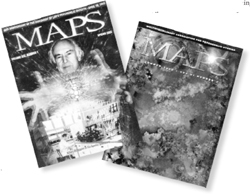
Tim Butcher I've been concerned with and quite active in drug policy reform since my teens. At one drug policy conference I saw MAPS' president, Rick Doblin, speak on a panel about psychedelic therapy - which I didn't know existed anymore. Following the panel, I just had to meet him, and Rick was surprisingly generous with his time and energy. Of course he had no idea I would become a serious MAPS funder - I know because I had no idea.
"…refusing
to allow
psychedelic
research
and therapy
is a grave injustice
to mankind."
I TOOK A FEW DOSES OF LSD in high school for "recreation." Then in my early 20s I took a fairly substantial dose. With my lifelong interest in neuroscience and philosophy, I quickly realized this mode of consciousness deserved serious respect, consideration, and study. As I reflected on the profound nature of that experience it became obvious that current policy of refusing to allow psychedelic research and therapy is a grave injustice to mankind. It seemed yet another ugly by-product of the failed War on Drugs, and I felt a personal need to do something about that. So finding out about MAPS' groundbreaking work was very refreshing. I was impressed that MAPS works within the legal and medical system rather than just complaining about and criticizing "the system." Around that time, my dad sold his successful art empire to us siblings, and my financial means greatly expanded. I was eager to learn about the latest psychedelic research and asked Rick what MAPS was doing and where. I first donated to some great high-tech psychedelic neuroscience in Switzerland - and I was hooked on the MAPS vision and strategy from then on. I became fast friends with the principal researchers for that study and started attending more conferences related to psychedelics. For this reason, Rick and MAPS always feels more like a family to me than a dry research center. I'm also a graphic artist, and it was delightful when Rick used one of my computer art pieces for the Bulletin cover art - that's the kind of personal attitude you don't see at many research journals and nonprofits. I've spread the message and Bulletin to friends and colleagues, organized MAPS outreach for festivals and parades, assisted in funding many research projects, traveled to Israel with a MAPS group for meetings and a conference about MDMA research, illustrated more Bulletins, and written a few neuroscience articles for MAPS. Even through inevitable changes over the years, Rick and the MAPS family always feel like my home away from home. It's been more than a decade since I've taken any real psychedelics myself, but they will always remain part of my interests in psychology and medicine, as a real frontier in helping real people with real difficulties (or simply personal growth). MAPS is without a doubt the most efficiently organized and accomplished psychedelic research organization around. MAPS and its members know that altered states of consciousness represent an important addition to more tradition survival strategies. Our chances for survival as a species improve with diversity, so if we come upon some dangerous condition, we have a variety of traits to deal with that danger just in case the more popular strategies aren't effective. Seeing the world from an alternate perspective has the potential to save us from our own misguided "common sense" about the way the world works - assumptions so obvious we never bother to question them even though they may be quite inaccurate or detrimental.  Tim‘s designs were featured
on two MAPS Bulletin covers:
Summer 1996 and Spring 2003.
Tim‘s designs were featured
on two MAPS Bulletin covers:
Summer 1996 and Spring 2003. LSD, "ecstasy," marijuana, and other psychedelics have a bad reputation among the general public. Each of these drugs has moved as far along Food and Drug Administration approval process as is possible - almost entirely due to the efforts of MAPS. Through the media, people get the idea "drugs" are bad, dangerous, or immoral - as strange an idea as if I said eating or driving or other potentially harmful activities are bad simply because some people wind up getting hurt doing them each year. Yet most all the drugs MAPS researches have already received high marks for safety by the FDA's own standards. The real social distortion of our attitudes about psychedelics lies not in the drugs themselves but, rather, in the states of mind that these drugs make possible. The drugs are just a convenient scapegoat for fearing nonordinary states of conscious. It's these states of mind that MAPS nurtures and finds appropriate ways for society to view with potential instead of paranoia. MAPS promotes a vision I've always shared, and it does so very efficiently compared to other nonprofits I've worked with. Once viewed as taboo, psychedelic research, therapies, and responsible personal use continue to evolve day-byday from the fringes of social acceptability to something much more mainstream. MAPS is the central engine behind this evolution, thanks to the dedication of its members and funders. As a MAPS donor, I get to be a part of it! I look forward to the day when I can joyfully explain to our next generation that psychedelics were once forbidden - but not anymore. Donating a few hundred or a few thousand dollars is a real privilege if it means slowly making history. And we are. I have a somewhat counterintuitive view of donations and giving that I wish more people shared: Nothing could be a bigger selfish pleasure than the pride I get signing a check or promoting a vision I believe in. For me, donating to worthy causes is quite selfish: I like the satisfaction of knowing I can make the world more like I want it; I like when others say good things about me; I like knowing a few more people believe this world is ours to change; and I like seeing progress and knowing I played some part in it. Of course, it's great that so many loving and generous people give out of duty, love of mankind, or social justice. But for me, I get far more from donating than I give. In the deepest sense, my long history of supporting MAPS is the most selfishly rewarding relationship with any nonprofit in my life.
"The fact that
timid philanthropists
with less flare are
often dissuaded
from organizations
like MAPS
makes the ones
who aren’t,
like me,
even more
needed."
Anybody can contribute without scrutiny to more standard causes like peace, poverty, the environment, reproductive rights, and so on. We all applaud that, and I'm proudly involved in those causes too. But psychedelics are stigmatized, and that can make potential donors feel anxious. Some fear that by donating to an organization like MAPS they'll risk tarnishing their reputation or becoming a target for the Drug Enforcement Administration, which simply doesn't happen. The fact that timid philanthropists with less flare are often dissuaded from organizations like MAPS makes the ones who aren't, like me, even more needed. I'm lucky to be a more "small-time" capitalist/philanthropist. The uniqueness of this research brings me intense gratification just in and of itself: We the "psychedelic community" are a relatively small group. I feel needed, noticed, and important as a supporter of MAPS, and those are just a few of my selfish reasons for membership. It's the family I get to choose. Aside from MAPS, I've always felt very political, and my remaining focus goes to other causes I feel strongly about, like political campaigns, voter registration, media reform, women's health and health in general, environment, drug policy reform, and so on. I have no logical formula that guides my donations, but MAPS generally hears from me the day I get a happily large tax return, bonus, or other notable revenue. Some of my favorite memories are those surprise calls to Rick, telling him to count me in on the newest projects.
"…MAPS promotes
a vision
I’ve always shared,
and it does so
very efficiently
compared to
other nonprofits
I’ve worked with."
But there's a personal dimension to MAPS that's always exceeded my expectations by leaps and bounds. I feel immeasurable pride reading some random news article that mentions MAPS' work, or passing by a TV when Rick Doblin is on some talk-show or documentary describing psychedelic research projects. You know what I mean if you've ever said, "Hey! I know that guy!" And knowing I'm somehow involved in what Rick is discussing - well, OK, I won't spoil the surprise. You'll just have to feel that excitement and pride yourself. And I know this isn't an advice column or anything, but I'd bet just about every reader would feel as great as I do if they gave a few hundred or a few thousand dollars to MAPS each year, or just when that unexpected check comes. To me the biggest honor has always been that I'm lucky enough to get in on the early stages of psychedelic research and therapy - during the relative youth of MAPS. Given the inevitable triumphs MAPS is bound to achieve over the next five, 10, or 20 years, I'd guess anybody reading this will share this same, singular pride by investing in MAPS now. Whether we're selfish or altruistic in our charitable priorities, a good bet is a good bet. I get to see the inception and completion of projects that our children will take for granted, but that we, the psychedelic community, fought tooth and nail to make happen. Each Bulletin brings a continuation of the long and winding adventure that only MAPS members and donors can truly appreciate. I'm excited that MAPS is doing so splendidly and that we are succeeding with "flying colors" in restarting psychedelic research: But in my selfish little heart of hearts, I'll always know I get the better deal! ¥ |
||
| < Return to Table of Contents: - Spring/Summer 2007 "The Chrysalis Stage" | ||